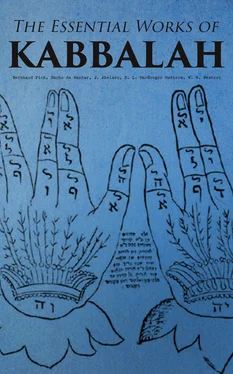The publication of Jellinek's Beitrdge sur Geschichte der Kabbala, 2 parts, Leipsic, 1852; and his Auszvahl kabbalistischer Mystik, part I, ibid., 1853; Stern's "Versuch einer umstandlichen Analyse des Sohar" (in Ben Chananja, Monatsschrift fur judische Theologie, Vols. I-IV, Szegedin, 1858-1861); Jost's Geschichte des Judenthums und seiner Sekten, Vol. Ill, pp. 66-81, Leipsic, 1859; more especially of Graetz's Geschichte der Juden, 1Vol. VII, pp. 73-87, 442459; 487-507, Leipsic, 1863, paved the way for Christian D. Ginsburg's (now very scarce) essay The Kabbalah, London, 1865. As a matter of course he adopts the results of modern scholarship and rejects the authorship of Simon ben Jochai.
As far as we are aware, nothing has been published in English since 1865. The Kabbalah Unveiled by S. L. M. Mathers, London, 1887, gives only a translation of some parts of the Zohar, which Knorr von Rosenroth had rendered into Latin. Nevertheless this work is interesting, because an English reader—provided he has enough patience—can get a taste of the Zoharic wisdom and unwisdom.
1The English translation of this work, published by the Jewish Publication Society of America, is of no service to the student, because the scholarly notes, which are the best part of the original, are entirely omitted.
CHAPTER I.
NAME AND ORIGIN OF THE CABALA.
Table of Contents
The Cabala.—By Cabala we understand that system of religious philosophy, or more properly, of Jewish theosophy, which played so important a part in the theological and exegetical literature of both Jews and Christians ever since the Middle Ages.
The Hebrew word Cabala (from Kibbel) properly denotes "reception," then "a doctrine received by oral tradition." The term is thus in itself nearly equivalent to "transmission," like the Latin tradition, in Hebrew masorah, for which last, indeed, the Talmud makes it interchangeable in the statement given in Pirke Abot I, 1: "Moses received {kibbel) the Law on Mount Sinai, and transmitted (umsarah) it to Joshua." The difference, however, between the word "Cabala" and the cognate term masorah is that the former expressed "the act of receiving," while the latter denotes "the act of giving over, surrendering, transmitting." The name, therefore, tells us no more than that this theosophy has been received traditionally. In the oldest Jewish literature (Mishna, Midrash, Talmud), the Cabala denotes the whole body of Jewish tradition. The name is even applied to the prophetic writings of the Old Testament, and the Hagiographa, in contradistinction to the Pentateuch. As a scientific system the Cabala is also called chokmat ha-cabalah, i. e., science of tradition, or chokmah nistarah (abbreviated ch'n, i. e., chcn, }n), i. e., secret science or wisdom, and its representatives and adherents delighted in calling themselves maskilim, i. e., "intelligent," or with a play of words yode ch'n, i. e., "connoisseurs of secret wisdom."
Having defined the term Cabala, which was still commonly used for "oral tradition" in the 13th and 14th centuries even after the technical sense of the word was established, we must be careful to distinguish between cabala and mysticism. Like other Eastern nations, the Jews were naturally inclined to theosophical speculation and though this tendency may have been repressed by the definite teaching of revelation as long as they were confined within the sacred boundaries of Palestine, it found a freer scope after the Exile.
There were two subjects about which the Jewish imagination especially busied itself,—the history of the Creation, and the Merkabah, or the Divine apparition to Ezekiel. Both touch the question of God's original connection with His creatures, and that of His continued intercourse with them. They treat of the mystery of nature and of Providence, especially of Revelation; and an attempt is made to answer the question, how the Infinite God can have any connection or intercourse with finite creatures.
It is difficult to say how far it is possible to trace with certainty Jewish mysticism. Even in the book of Sirach (Ecclus, xlix. 8) it is the special praise of Ezekiel that he saw the chariot of the Cherubim. When we come to the period of the Mishna, we find the existence of a body of esoteric doctrine already presupposed. It is laid down that "no one ought to discourse the history of Creation (Gen. i) with two, or the Chariot (Ezek. i) with one, unless he be a scholar, who has knowledge of his own" (Chagigall, 1).
Further allusions to these mysterious doctrines occur in the Talmud, but any rash investigation of them was discouraged, as is shown by the story of the four sages in "the enclosed garden," i. e., who were engaged in theosophical studies. One of them, it was said, had looked around and died; another had looked around and lost his reason; a third eventually tried to destroy the garden; 1while the fourth alone had entered and returned in safety (Chagiga, fol. 14, col. 2).
Little by little mysticism made its way from Palestine into Babylonia and found many followers. Its adepts called themselves "Men of Faith." They boasted of possessing the means of obtaining a view of the divine household. By virtue of certain incantations, invocations of the names of God and the angels, and the recitation of certain prayer-like chants, combined with fasting and an ascetic mode of living, they pretended to be able to perform supernatural deeds. For this purpose they made use of amulets and cameos (Kameoth), and wrote upon them the names of God and the angels with certain signs. Miracle-working was a trifle to these mystics. The books which they wrote only gave hints, and only those were initiated into the mystic secrets, in whose hand and forehead the adepts pretended to discover lines that proved them to be worthy of being initiated.
Origin of the Cabala.—Deferring until later the works belonging to this period, we will now speak of the origin of the Cabala. Although the name "Cabala" in its pregnant meaning is first used in the 13th century, yet Jewish tradition claims a high antiquity for the Cabala and traces it back, among others, to three famous Talmudists, as the proper founders of the Cabala, viz., Rabbi Ismael ben Elisa (about 121 A. D.) ; Nechunjah Ben-Ha-Kanah (about 70 A. D.), and especially Simon ben Jochai (about 150 A. D.), 2the reputed author of the Zohar.
Whatever may be the claims of these traditions they must be rejected. The mystical speculations of the Cabala are entirely foreign to older Judaism, especially original Mosaism. It is true that the Talmud contains many things concerning God, heaven, hell, world, magic, etc., 3but these things were generally assigned to some individuals, and are elements derived from Parsism and neo-Platonism; and much as the Talmud and Midrash may otherwise speak of the three teachers mentioned before, such things are not recorded of them. The Cabala as a mystical system and its development as such undoubtedly belongs to the Middle Ages, beginning probably with the seventh century of our era, and culminating in the Book Zohar. A fuller and more mature development of the Cabala is due to the speculations of later masters.
The origin of the Cabala belongs to that period in which Judaism on the one hand was permeated by a crude anthropomorphic notion of the Deity, whereas on the other hand Platonism and Aristotelianism strove for the ascendency in formulating the fundamental doctrines of Jewish belief. With Moses Maimonides (1135-1204) rationalism had reached its climax. The injunctions of the Bible were only to be explained by the light of reason. Only the simple, primary or literary sense (peshat) of the Scripture was recognized, the existing allegorical interpretation (dcrush) was considered either as rabbinical fancy, or one saw in it only a poetical form. Even the Talmud had been systematized and codified. Religion had become a more or less meaningless opus operatum. Philosophy had always been treated as something secondary, which had nothing to do with practical Judaism, as it is daily and hourly practiced. Maimonides, on the other hand, had introduced it into the holiest place in Judaism, and, as it were, gave Aristotle a place next to the doctors of the Law. Instead of unifying Judaism, Maimonides caused a division, and the Maimunists and Anti-Maimunists opposed each other. A reaction came and the Cabala stepped in as a counterpoise to the growing shallowness of the Maimunists' philosophy. The storm against his system broke out in Provence and spread over Spain. The latter country may be considered as the real home of the Cabala. When the Jews were driven from that country, the Cabala took root in Palestine and thence it was carried back into the different countries of Europe.
Читать дальше












